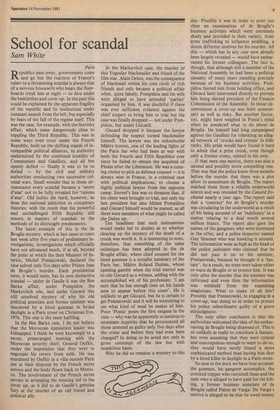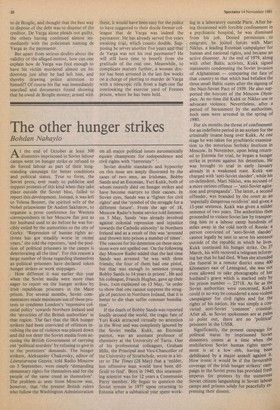School for scandal
Sam White
Paris Republics pass away, governments come and go but the reaction of France's rulers to a threatening scandal is always that of a nervous housewife who hears the floorboards creak late at night — to dive under the bedclothes and cover up. In the past this could be explained by the apparent fragility of the republic and its institutions under constant assault from the left, but especially by fears of the fall of the regime itself. This was the case, for example, with the Stavisky affair, which came dangerously close to toppling the Third Republic. This was in some ways even truer under the Fourth Republic, built on the shifting stands of incompatible political alliances, its authority undermined by the combined hostility of Communists and Gaullists, and all but openly defied — finally it was to be so defied — by the civil and military authorities conducting two successive colonial wars. Small wonder that in those circumstance every scandal became a 'secret d'etat' not to be fully revealed for `raisons d'etat'. Old habits die hard, however, as does the national addiction to conspiracy theories: with the result that the powerful and unchallenged Fifth Republic still resorts in matters of scandals to the methods of its distraught predecessors.
The latest example of this is the de Broglie mystery, which at last came to court last week after five years of preliminary investigations, investigations which officially have not advanced much, if at all, beyond the point at which the then Minister of Interior, Michel Poniatowski, declared the case solved only five days after Prince Jean de Broglie's murder. Each presidential term, it would seem, has its own distinctive scandal — under de Gaulle it was the Ben Barka affair, under Pompidou the Markovitch one, and under Giscard this still unsolved mystery of why his old political associate and former minister was murdered by a hired gunman in broad daylight in a Paris street on Christmas Eve, 1976. This one is the most baffling.
In the Ben Barka case, I do not believe that the Moroccan opposition leader was kidnapped. I think he went knowingly to a secret, prearranged meeting with the Moroccan security chief, General Ouflcir, under the impression that they were to negotiate his return from exile. He was murdered by Oufkir in a villa outside Paris put at their disposal by the French secret service and the body flown back to Morocco. The involvement of the French secret service in arranging the meeting led to the cover up, as it did to de Gaulle's genuine fury at the murder of an old friend and Political ally. In the Markovitch case, the murder of this Yugoslav blackmailer and friend of the film star, Alain Delon, was the consequence of blackmail within his own circle of rich friends and only became a political affair when, quite falsely, Pompidou and his wife were alleged to have attended 'parties' organised by him. It was doubtful if there was ever sufficient evidence against the chief suspect to bring him to trial but the case was finally dropped — not under Pompidou, but under Giscard.
Giscard dropped it because the lawyer defending the suspect turned blackmailer himself. The lawyer was the redoubtable Maitre Irsorni, one of the leading lights of the Paris bar who had been at war with both the Fourth and Fifth Republics ever since he failed to obtain the acquittal of Petain after the Liberation. He was a cunning choice to pick as defence counsel — it is always wise in France, in a criminal case with political implications, to choose a highly political lawyer from the opposite camp. Irsorni's line was to threaten that, if his client were brought to trial, not only the late president but also Mdme Pompidou and Giscard himself would be named, as all three were members of what might be called the Delon set.
The headlines that such insinuations would make led to doubts as to whether clearing up the mystery of the death of a crook was worth it. It is interesting to note, therefore, that something of the same technique has been adopted in the de Broglie affair, where chief counsel for the hired gunman is a socialist luminary of the Paris bar, Maitre Roland Dumas, whose opening gambit when the trial started was to cite Giscard as a witness, adding with the accomplished wit of his profession: 'I am sure that he has enough time on his hands now to appear before this court'. He is unlikely to get Giscard, but he is certain to get Poniatowski and it will be interesting to see what kind of meal he makes of him. Poor 'Ponia' poses the first enigma in the case — why was he apparently so anxious to terminate inquiries that he pronounced all those arrested as guilty only five days after the crime and before they had even been charged? In doing so he acted not only in gross contempt of the law but with suspicious haste.
Why he did so remains a mystery to this day. Possibly it was in order to avert too close an examination of de Broglie's business activities which were extremely shady and provided in their variety, from arms trafficking to influence peddling, a dozen different motives for his murder. All this — which has in any case now already been largely revealed — would have embarrassed his former colleagues. The fact is, though, that although still a member of the National Assembly he had been a political casualty of many years standing precisely because of his business activities. Pompidou barred him from holding office, and Giscard later intervened directly to prevent him being elected president of the Finance Commission of the Assembly. In those circumstances a cover-up was both unnecessary as well as risky. But another factor, too, might have weighed in Ponia's mind when he pondered what to do about de Broglie. He himself had long campaigned against the Gaullists for tolerating an alleged network of 'crooks and cronies' in their ranks. His pride would have found it hard to admit that a prize crook, even though only a former crony, existed in his own.
If that were one motive, there was also a second and possibly more compelling one. That was that the police knew three months before the murder that there was a plot afoot to assassinate de Broglie. The report reached them from a reliable underworld source and was revealed by the Canard Enchaine nearly a year ago. The report said that a 'contract' for de Broglie's murder was circulating in the underworld as a result of his being accused of an 'indelicacy' in a matter relating to a deal worth several million francs. The report also gave the names of the gangsters who were interested in the offer, and a police inspector named Guy Simonet who was hawking it around. The information went as high as the head of the police judiciaire who claimed that he did not pass it on to his minister, Poniatowski, because he thought it a 'fantasy'. As a result, no steps were taken either to warn de Broglie or to protect him. It was only after the murder that the minister was informed and even then the information was withheld from the examining magistrate. What to make of all this? Possibly that Poniatowski, in engaging in a cover-up, was doing so in order to protect his police subordinates guilty of a grave misjudgment.
The only other conclusion is that the authorities welcomed the idea of the embarrassing de Broglie being disposed of. This is so unlikely as really to constitute a fantasy, but even assuming that they were cynical and unscrupulous enough to want to do so, they would have surely found a more sophisticated method than having him shot by a hired killer in daylight in a Paris street.
So now in the dock we have four accused: the gunman, his gangster accomplice, the crooked copper who recruited them and the man who is alleged to have paid for the killing, a former business associate of de Broglie called Pierre de Varga. De Varga's motive is alleged to be that he owed money to de Broglie, and thought that the best way to dispose of the debt was to dispose of the creditor. De Varga alone pleads not guilty, the others having confessed almost immediately with the policeman naming de Varga as the paymaster.
But apart from serious doubts about the validity of the alleged motive, how can one explain how de Varga was fool enough to have his victim murdered almost on his doorstep just after he had left him, and thereby drawing police attention to himself? Of course his flat was immediately searched and documents found showing that he owed de Broglie money; armed with these, it would have been easy for the police to have suggested to their docile former colleague that de Varga was indeed the paymaster. He has already served five years awaiting trial,, which counts double. Supposing he serves another five years and that de Varga was not his real paymaster? He will still have time to benefit from the gratitude of the real one. Meanwhile, to complicate matters further, a woman doctor has been arrested in the last few weeks on a charge of plotting to murder de Varga with a telescopic rifle from a high-rise flat overlooking the exercise yard of Fresnes prison, where he has been held.



































 Previous page
Previous page